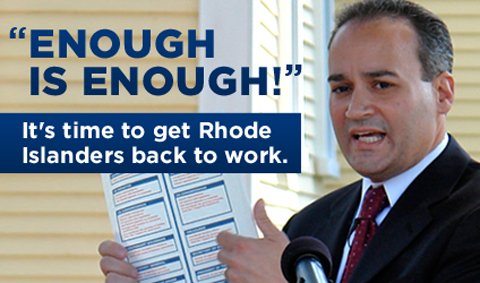
HE’S HAD IT Gemma took an aggressive approach at the end of the 2010 campaign. |
There is a strange duality to businessman Anthony Gemma's all-but-official Congressional campaign.
Scroll through his Twitter feed and you'll find the clichéd, feel-good aphorisms of a motivational speaker on the make: "Don't limit your Challenges — Challenge your Limits!"
But pick up a newspaper or turn on the television and you'll find something quite different: a sharp, even angry critique of his would-be opponent in the Democratic primary, David Cicilline. The Congressman is an "incompetent," Gemma intones, a "liar" who is "unfit to serve."
It is a jarring dichotomy. But it's a familiar one.
In a four-way Democratic race for the same seat in 2010, Gemma began with a goofy appeal to "hope" and a quirky, upbeat disquisition on government reform (better web sites!) before shifting — when that wasn't enough — to withering attacks on his opponents.
The message was good enough for a second-place finish, albeit a distant one — 14 points behind Cicilline. But it felt disjointed. Amateurish.
Under normal circumstances, the same campaign wouldn't fare much better the second time around. But these are not normal circumstances.
The ground has shifted. The public is deeply angry with Cicilline, now. And Gemma's Jekyll and Hyde routine — at least the Hyde part — suddenly seems more viable.
But is it enough?
THE UPSIDE OF ANGER
It is, of course, difficult to pinpoint the reasons for a candidate's appeal.
But in 2010, Gemma seemed to find his voice — and push closer to the top of the pack — when he turned to a bristling critique of Cicilline, who was still serving as mayor of Providence during the campaign.
Gemma staged a press conference on the steps of City Hall, skewering his opponent's stewardship of the Providence schools. An attack ad, noting that Cicilline was running on his mayoral record, asked incredulously, "Are you kidding me?"
And Gemma went so far as to pen a letter to the Democratic Congressional Campaign Committee in Washington calling out Cicilline's "patterns of deception, misconduct, and dereliction of duty" and suggesting he be pushed out of the race.
The assault, which seemed fired by a genuine personal animus, connected with a certain segment of the electorate turned off by Cicilline's slick persona, shady brother, and inevitable association — by dint of job title — with a capital city politics long viewed as corrupt.
Still, the message seemed out of synch with the public mood, writ large. After eight years in the mayor's office, the shine had certainly worn off Cicilline. But for most Democratic voters, there was no compelling reason to be angry at the mayor.
Indeed, Gemma's ire seemed — in a way — as peculiar as his signature policy proposals: a "town hall in the mall," an "executive board" of top elected officials that would run Rhode Island like a $7 billion corporation, a push to make the state the "wellness" capital of America.
But the mood, of course, has changed since then.
Cicilline declared Providence in "excellent fiscal condition" during the campaign. And when his City Hall successor, Mayor Angel Taveras, declared a "category 5 hurricane" on the city's books, voters felt betrayed.